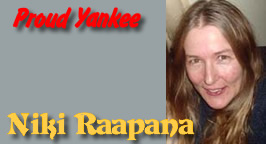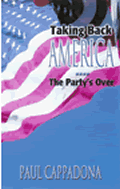Other
Raapana
Articles:
Coming Soon
CAFTA,
THE EU & COMMUNITARIAN LAW
PART 1 of 2
By Niki Raapana
January 25, 2006
NewsWithViews.com
How both parties sold America down the river
After
wading through all the publications and websites representing both support
and opposition for the Central American Free Trade Agreement (CAFTA-approved
by the U.S. Congress July 2005), it's astonishing to realize how very
few of them bother to explain the legal foundation for the agreement.
CAFTA, like most international trade agreements, is based entirely in
the supremacy of communitarian law.
This
isn't Bush and Clinton quietly slipping in communitarian programs like
Local Agenda 21 that bury communitarian laws deep inside hefty grants
and incentives. The U.S. Congress has officially denounced their own Constitution
as Supreme Law. When the United States Congress approved CAFTA they endorsed
a regional trade agreement that places U.S. Constitutional Law below
Communitarian Law. While communitarian law is without a doubt the most
important legal topic in the world, American experts on both "sides" of
the free trade arguments completely ignore it. Consequently, it's the
rare American who has any concept of how prevalent or powerful this new
system of justice is.
The
European Court of Justice is occassionally referred to as the Communitarian
Court of Justice. CAFTA officials openly discuss using the EU as their
model for communitarian case law. Communitarian Regulations govern the
archiving of EU legal documents. The term communitarian law is in hundreds
of online law journals. It's taught in several foreign law schools and
there are degreed law professors of Communitarian Law. The Jean Monet
program sponsors symposiums on it at U.S. universities. The D.C. Communitarian
Network sends out a communitarian law newsletter. It's a widely understood
term in Europe, Central, and South America. Still, Communitarian Law is
so unfamiliar to U.S. Americans (and their attorneys) that most have never
once heard the terms used.
One
reason for its obscurity comes from the fact that communitarian law is
also called Community Law, community aquis, and aquis communitaire. But
another reason for its obscurity is the simple fact that globalists don't
want our people to know anything about it. The European Constitution
was defeated at the polls by the Dutch and the French voters because of
its supremacy of communitarian law. The last thing the communitarian supra-nationalists
want to happen is for all of America to learn the whole truth about communitarian
"free trade." Remember, universities in England, Spain, Portugal, and
Romania offer coursework and masters programs in Communitarian Law. Only
a few elite American universities offer courses in communitarian law,
and barely a handful of American students have ever studied it.
The
vice-president of the EU Constitutional Convention sums it up nicely:
"One must act 'as if' in Europe: as if one wanted only very few things, in order to obtain a great deal. As if nations were to remain sovereign, in order to convince them to surrender their sovereignty. The Commission in Brussels, for example, must act as if it were a technical organism, in order to operate like a government ... and so on, camouflaging and toning down. The sovereignty lost at national level does not pass to any new subject. It is entrusted to a faceless entity: NATO, the UN and eventually the EU. The Union is the vanguard of this changing world: it indicates a future of Princes without sovereignty. The new entity is faceless and those who are in command can neither be pinned down nor elected ... That is the way Europe was made too: by creating communitarian organisms without giving the organisms presided over by national governments the impression that they were being subjected to a higher power.
That is how the Court of Justice as a supra-national organ was born. It was a sort of unseen atom bomb, which Schuman and Monnet slipped into the negotiations on the Coal and Steel Community. That was what the 'CSC' itself was: a random mixture of national egotisms which became communitarian. I don't think it is a good idea to replace this slow and effective method - which keeps national States free from anxiety while they are being stripped of power - with great institutional leaps - Therefore I prefer to go slowly, to crumble pieces of sovereignty up litle by little, avoiding brusque transitions from national to federal power. That is the way I think we will have to build Europe's common policies..."
- Italian Prime Minister Giuliano Amato, later Vice-President of the EU Constitutional Convention, interview with Barbara Spinelli, La Stampa, 13 July 2000. Posted in a great list of quotes compiled by Free Europe Blog.
How is it possible that Americans, with their "free press" and literate population are completely unfamiliar with the term communitarian law? The problem appears to be a constitutional issue over the definition of treason. Communitarian law is designed to over-rule all national law, including the U.S. Constitution and Bill of Rights. Why do so many Americans flat out refuse to consider the possibility that current events resulting in federal legislation and Executive Orders are related? Communitarian laws balance individual rights against "safety" (as do the Patriot Act and the Homeland Security Act). This shows a pattern of thought, doesn't it? Part of the problem is the American people don't believe there are any more Hitlers or Stalins.
They
believe communism "died" in the eighties, and that former evil colonial
rulers all magically, spiritually evolved into nice, kind "helpers."
This amazing under-education promotes such a naive approach to modern
politics that admitting the unknown is almost impossible for them. Indeed,
many prefer to "shoot the messenger" rather than admit they somehow missed
the most important legal development of the 20th century. The fact is,
communitarian law and philosophy are so well hidden from the American
people that many have accused this author of making the terms up as a
part of my own personal "conspiracy theory."
European
voters, on the other hand, are much more familiar with the terms of the
new agreements. Dutch and French voters rejected the European Constitution
because of its basis in the supremacy of communitarian law. With a rare
openness regarding the controversy, James Kanter reported in the International
Herald Tribune on Sunday, January 1, 2006 that, "There are some tendencies
within the European Union that can be seen with critical eyes," he said,
notably "an extension of communitarian law by the European court." (
From Austria, 'new thoughts' for EU)
Besides
CAFTA, many other "soft" communitarian legal agreements have been made
between U.S. officials with international and supranational organizations.
The U.S. has been governed by communitarian laws for decades. Communitarian
legislation is before every legislative body in the country. Readers who've
been studying the meaning of Sustainable Development will immediately
recognise the true meaning of communitarian law. Communitarianism puts
the rights of the community "at large" over the rights of the individuals
living in the community. This is the entire foundation for anything communitarian.
Global communitarians came to the U.S. to "shore up the moral, social
and political environment." They came to "balance" American's selfish
individualism (and outdated and dangerous nationalism) against their definition
of the collective good.
Each member state choosing to join the supra-national organization must modify their national constitutions to accommodate communitarian principles. Communitarian Law balances the rights of individuals and nations against the rights of the "community." It requires nations to make political and legal internal reforms. Communitarian law integrates nations into the global communitarian justice system. The term "community," when used by global communitarians, can define everything from smallest rural area to the entire region, as in the "European Community." Today the EU Communitarian Court is used as the model for all regional trade agreements in the works.
The
United Nations is also based entirely in the supremacy of communitarian
law. Communitarian law supports the mandates for sustainable and smart
growth principles established in UN Local Agenda 21. Besides the communitarian
supremacy of CAFTA and in other proposals for a North American Free Trade
Agreement, there are also plans to create a communitarian code of justice
for the Middle East.
Communitarian
Community based Development is the structure for implementing the new
system of law. Bush called it Re-Building Community when he explained
the new War on Terror in February 2002, and he wasn't kidding. The idea
for re-building every community in the world under the control of a powerful
community government is well underway in every nation. It's being violently
exported to Afghanistan, Palestine, Iraq and discussions have begun to
export the law into the entire Middle East. It's being quietly adopted
by local stakeholder councils across the U.S. Everywhere, from Mexico
to Peru, Serbia to Malaysia, the Philippines to Russia, China to the UK,
the EU to Central America, all are in the process of subordinating national
law under regional communitarian authority. No place in the entire world
has been left behind.
The original American system, now much denigrated and ridiculed, was based entirely in the idea of protecting local markets from imperialist monopolies. When we "threw out the British," we threw out their banker's control over our trade, production and land. The U.S. federal government was later designed to protect our national borders from continual imperialist invasions. It was authorized to regulate trade and commerce between the free and independent states and to establish a national bank to coin American money. The bank had private investors but it was regulated by officials in the U.S. Government, who were responsible to the states. The first bank funded state banks who provided loans to build a transportation infrastructure, and it made small loans to small businessmen and cottage industries along the routes.
The plan was to make the U.S. entirely self-sustaining both economically and politically. We were working toward a balance between agriculture and industry, whereas after achieving it we would slowly begin to engage in foreign trade with equals. During those years, before taxes, the U.S. built up a huge surplus in the U.S. Treasury. The American national system worked so well here it was copied by almost every imperial colony during the first half of the 19th century. (The early 1800s could be described as the "Declaration of Independence" Days.) But that didn't last long before the international bankers were back in control of everybody's land.
|
Subscribe to the NewsWithViews Daily News Alerts! |
Now we have the private corporations called the World Bank and the Federal Reserve. We have a progressive tax and an unfathomable national debt. Today the "idea" of a national system or a national bank is ridiculed as a capitalist, elitist idea. Protected trade and tariffs are regarded as selfish, anti-human sentiments. Individual rights are really just a barrier to peace and social justice. Private land is ecologically unsustainable. The communitarian banker's plan is more "fair," or you're an uneducated buffoon. Click below for part two.
Click here for part -----> 2
References:
1, www.fas.usda.gov/itp/CAFTA/cafta.html
2,
Why
We Oppose Cafta by the Oakland Institute.
3, The
Creation of a Communitarian System of International Law cyber.law.harvard.edu.
4, pdf-Harmonization
and harmonizing measures in criminal law, Royal Netherlands Academy
of Arts and Sciences.
5, Court Buttresses Eminent Domain:
Local
Governments Cleared to Take Private Property if Projects Promise Growth
6, Integration
to the EU and Economic Transformation: State and Its Role on the Example
of the Export-Promoting Policy by Marek Csabay
7, Presentation
by Dr Jan Mazak, President of the Slovak Constitutional Court 21.10.2004.
8, University
of Oradea Faculty of Law and Jurisprudence
9, From
Aquamont to Berlaymont: On the Integration-Friendly Features of the Slovak
Constitution by RADOSLAV PROCH�ZKA
10, EDUCATION
IN EUROPEAN LAW AT THE POLICE ACADEMY OF THE CZECH REPUBLIC
11, commlaw@hermes.gwu.edu
12, THE
FUTURE OF CONSTITUTIONAL CONFLICT IN THE EUROPEAN UNION:CONSTITUTIONAL
SUPREMACY AFTER THE CONSTITUTIONAL TREATY* by Mattias Kumm and Victor
Ferreres Comella.
13, Historical
Archives Service of the European Commission "ARCHISplus (French ARChives
HIStoriques) is the Historical Archives of the European Commission's database
which contains references to files of European institutions from their
beginnings to today. It is extracted from an internal database, Archis,
and includes those references only which are helpful to access historical
files open to the public according to communitarian regulations pertaining
to their archives (30 years rule)."
� 2006 Niki Raapana- All Rights
Reserved
Niki Raapana was trained in government document research at the University of Massachusetts, Amherst. Raised by a career Army NCO, she traveled the U.S. most of her life. Her dad taught her it is every American's job to defend the rights of people who are unable to defend themselves.
After her landlord complained that the city was out to steal his land, Niki agreed to study Seattle's development plans for him in March 1999. In September 1999 she found out the city planned to do a lot more than steal Hugh's land. She identified the Communitarian Network's connection to the plans in March 2000.
Niki filed many public disclosure requests for Hugh Sisley and in the fall of 2001 the City of Seattle ceased actions against his properties based on Niki's research. By 2002 she had provided 2500 documents for Dawson et. al. v. The City of Seattle et. al, a 4th Amendment lawsuit currently under consideration before the Ninth District Court of Appeals.
Niki
co-founded the Anti-Communitarian League with her (then) teenage daughter
Nordica, in April, 2001.
E-Mail: nikiraapana@gmail.com
The U.S. Congress has officially denounced their own Constitution as Supreme Law. When the United States Congress approved CAFTA they endorsed a regional trade agreement that places U.S. Constitutional Law below Communitarian Law.













